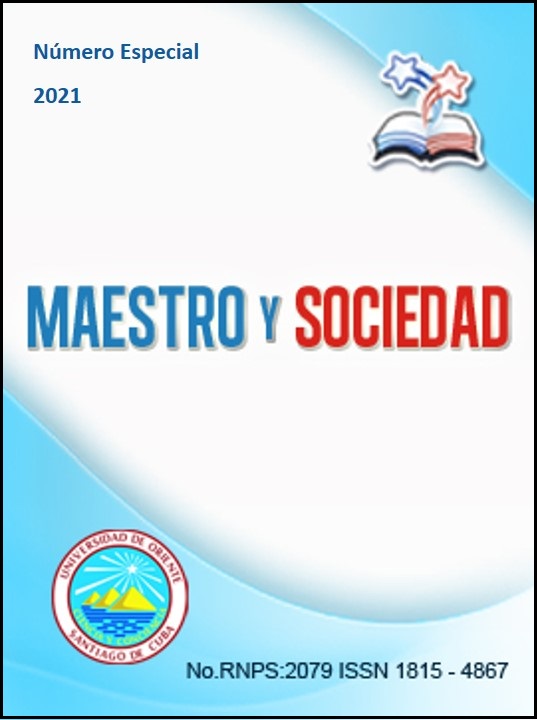The leadership style of the director and satisfaction in the student of the Technological Institutes
Array
Keywords:
Leadership, Satisfaction, Schools, DirectorsAbstract
The objective of the study was to determine the leadership style (transformational and transactional) exercised by the Director from the students' perception, as well as the satisfaction that these students experience in a Public Technological Education Institute (IESTP). The methodology had a quantitative approach, an advanced descriptive level with a correlation design. Transformational leadership is shown to have quite a positive impact on student satisfaction. Furthermore, transactional leadership, unlike other studies, is also an important determinant of student satisfaction. The leadership exercised by the Directors of the Institutes is satisfactory for the students, highlighting positive interpersonal relationships, active identification with the institution; participation in events. It concludes by revealing the need to continue exploring the aspects of critical thinking as an essential attribute of transformational leadership.
References
2. AntonaKis, J., & House, R. J. (2014). Instrumental leadership: Measurement and extension of transformational–transactional leadership theory. The Leadership Quarterly, 25(4), 746-771.
3. Aydin, A., Sarier, Y., & Uysal, S. (2013). The Effect of School Principals’ Leader-ship Styles on Teachers’ Organizational Commitment and Job Satisfaction. Educational sciences: Theory and practice, 13(2), 806-811.
4. Bass, B. M., & avoLio, B. J. (1994). Transformational leadership and organizational culture. The International Journal of Public Administration, 17(3-4), 541-554.
5. CHen, A. S. Y., bian, M. D., & Hou, Y. H. (2015). Impact of transformational leadership on subordinate’s EI and work performance. Personnel Review, 44(4).
6. Deroncele Acosta, A., Gross Tur, R., & Medina Zuta, P. (2021). El mapeo epistémico: herramienta esencial en la práctica investigativa. Universidad Y Sociedad, 13(3), 172-188. Recuperado de: https://rus.ucf.edu.cu/index.php/rus/article/view/2088
7. Deroncele, A. (2020). Competencia epistémica del investigador. En A. M. de Vicente Domínguez y N. Abuín Vences (Coords), LA COMUNICACIÓN ESPECIALIZADA DEL SIGLO XXI (pp. 53-77). Madrid, España: McGraw-Hill. ISBN: ISBN: 978-84-486-2434-7. https://bit.ly/3ANOsWw
8. Deroncele, A. (2020). Paradigmas de investigación científica. Abordaje desde la competencia epistémica del investigador. Revista Arrancada, 20(37), 211-225. https://revistarrancada.cujae.edu.cu/index.php/arrancada/article/view/331/233
9. Deroncele, A., Del Toro, M., y López, R. (2016). Método formativo de la práctica profesional del psicólogo. Revista Opuntia Brava. 8(3), 1-12. Recuperado de: http://opuntiabrava.ult.edu.cu/index.php/opuntiabrava/article/view/265/260
10. Deroncele, A., Nagamine, M., y Medina, D. (2020). Bases epistemológicas y metodológicas para el abordaje del pensamiento crítico en la educación peruana. Revista Inclusiones, 7(Número Especial), 68-87.
11. Deroncele, A., Nagamine, M., y Medina, D. (2020). Desarrollo del pensamiento crítico. Revista Maestro y Sociedad, 17(3), 532-546.
12. Ewen, C., wiHLer, A., bLicKLe, G., oerder, K., eLLen, B. P., dougLas, C., & fer- ris, G. R. (2013). Further specification of the leader political skill–leadership effectiveness relationships: Transformational and transactional leader behavior as mediators. The Leadership Quarterly, 24(4), 516-533.
13. Grissom, J. A., & Loeb, S. (2011). Triangulating principal effectiveness how perspectives of parents, teachers, and assistant principals identify the central importance of managerial skills. American Educational Research Journal, 48(5), 1091-1123.
14. HambricK, D. C. & Mason, P. A. (1984). Upper echelons: The organization as a reflection of its top managers. Academy of management review, 9(2), 193-206.
15. Kinchington, F. (2019). Critical thinking in leadership: Leading change in complex contexts. International Perspectives on Leadership in Higher Education: Critical Thinking for Global Challenges (Book Chapter), 31-43, doi: 10.4324/9781315122410-4
16. Ledo, C., y Deroncele, A. (2017). El diplomado de Educación Superior para jóvenes docentes y su impacto en los procesos universitarios. Revista Didasc@lia: Didáctica y Educación, 8(7), 1-10. https://refcale.uleam.edu.ec/index.php/didascalia/article/view/1833
17. Mendoza, M. R., Ortiz, C. (2006). El Liderazgo Transformacional, Dimensiones e Impacto en la Cultura Organizacional y Eficacia de las Empresas. Revista Facultad de Ciencias Económicas: Investigación y Reflexión, XIV(1), 118-134. https://www.redalyc.org/pdf/909/90900107.pdf
18. Pedraja-Rejas, L., Rodríguez-Ponce, E., Barreda, M., Sagredo, O., & Segovia, C. (2009). Estilos de liderazgo y resultados del sistema de medición de la calidad de la educación: un estudio empírico en los colegios básicos de la ciudad de Arica-Chile. Ingeniare. Revista chilena de ingeniería, 17(1), 21-26.
19. Powley, E. H., Taylor, S.N. (2014). Pedagogical Approaches to Develop Critical Thinking and Crisis Leadership. Journal of Management Education, 38(4), 560-585, doi: 10.1177/1052562913519081
20. Tardo, Y., Fernández, Y. & Deroncele, A. (2019). Gestión para la evaluación del impacto formativo de las investigaciones educativas. Revista Inclusiones, 6(3), 46-62. http://revistainclusiones.org/index.php/inclu/article/view/70
21. Ten-Bruggencate, G., Luyten, H., Scheerens, J. & sLeegers, P. (2012). Modeling the Influence of School Leaders on Student Achievement How Can School Leaders Make a Difference? Educational Administration Quarterly, 48(4), 699-732.
22. Valentine, J. W. & Prater, M. (2011). Instructional, transformational, and managerial leadership and student achievement: High school principals make a difference. NASSP Bulletin.
23. Werner, S.H., Bleich, M.R. (2017). Critical thinking as a leadership attribute. Journal of Continuing Education in Nursing, 48(1), 9-11, doi: 10.3928/00220124-20170110-03
24. Yang, M. L. (2012). Transformational leadership and Taiwanese public relations practitioners’ job satisfaction and organizational commitment. Social Behavior and Personality: an international journal, 40(1), 31-46.
Published
How to Cite
Issue
Section
License
This journal provides immediate open access to its content, based on the principle that offering the public free access to research helps a greater global exchange of knowledge. Each author is responsible for the content of each of their articles.



























 Universidad de Oriente
Universidad de Oriente 